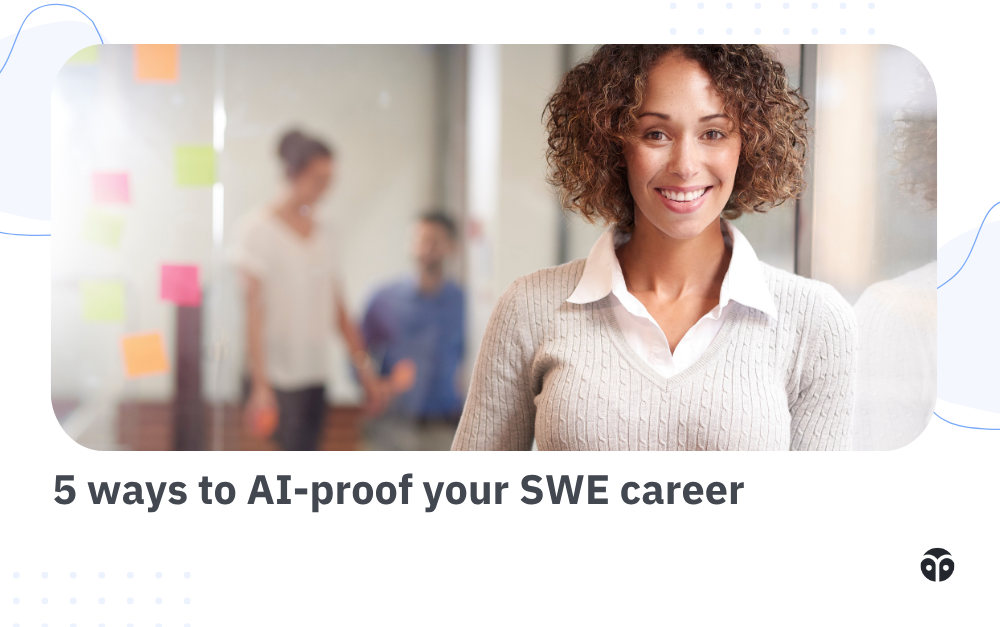5 ways to AI-proof your SWE career
Here's how to stay relevant, effective, and in demand as AI becomes part of the job

AI is already changing how software gets written. Tools like Copilot and Devin are speeding up development, offloading boilerplate, and reshaping how teams build.
But they’re not replacing engineers. They’re changing what’s expected of them.
To stay sharp and in demand, you don’t need to outpace AI. You need to focus on the parts of the job that still require human thinking and get better at using the tools that help you move faster.
As AI takes on more of the surface-level work, here’s how to strengthen the parts of your career that still depend on human expertise.
1. Master judgment, not tools
It’s easy to get caught up in the tool cycle, learning every new agent, framework, or plugin. But tools change fast. What lasts is your ability to make good decisions.
Judgment is knowing when to ship vs refactor, how to scope a feature, and when to push back. It’s what lets you assess AI-generated code with confidence instead of just accepting or rejecting it.
Rather than chasing every new AI tool, focus on getting better at things AI still struggles with:
- Weighing tradeoffs
- Prioritizing long-term maintainability
- Designing for edge cases and ambiguity
AI can write code. It can’t tell you whether that code is a good idea.
2. Think in systems, not features
AI is getting better at outputting individual features, but it still struggles to hold the shape of a system in its head.
That’s your job.
If your workflow centers around isolated tasks, you’re operating in territory that AI is rapidly learning to navigate. But if your value comes from understanding how all those parts fit together, how they evolve, and where the system breaks under pressure, you’re future-proofing yourself.
If you want to build career resilience, shift your focus from outputting code to designing systems:
- How does data flow?
- What’s the long-term cost of this abstraction?
- Where will this system break under scale or change?
You should be able to model complexity, work across boundaries, and make choices that support future growth.
3. Become AI-literate
If you’re going to work alongside AI, it helps to know how it works.
That doesn’t mean you need a PhD in machine learning. But it does mean having a working understanding of the tools and systems.
At a minimum:
- Learn how large language models interpret prompts and generate output
- Experiment with prompting, chaining, and reviewing AI-generated code
- Understand the difference between autocomplete, agents, and orchestration frameworks
Treat AI literacy like you would treat understanding a new platform or runtime. The better you understand what’s happening under the hood, the better you can use it (and spot when it’s wrong).
Just as important is learning how to work with these tools. Prompting well is a skill. So is reviewing AI-generated code critically, integrating agents into your workflow, and setting the right boundaries between human and machine.
This is the new layer in the stack. Learn it early and on your terms. Engineers who know how to collaborate with AI will outperform those who don’t.
4. Level up where AI can’t reach
There are parts of the job that aren’t going anywhere:
- Communicating clearly with other humans
- Leading projects with incomplete requirements
- Coaching junior engineers and sharing context
- Understanding your company’s domain and constraints
These are all high-leverage parts of the job — and often what separates a good senior engineer from a great one. If you’ve been heads-down in code for years, now’s the time to zoom out and sharpen these muscles.
The same goes for domain expertise. AI can predict the next token, but it can’t understand the regulatory nuance of your healthcare product or the onboarding pain in your fintech app. Knowing your industry, users, and edge cases will always be an advantage.
If you're looking for long-term leverage, invest in the things AI isn’t chasing.
5. Stay close to the hard stuff
Staying hands-on with debugging, refactoring, and exploring unfamiliar systems is where you build the intuition that tools can’t replace. That’s how you spot the architectural seams, catch silent regressions, and make calls under pressure.
The best engineers are pattern recognizers. They’ve seen how things break, how teams react, and where short-term wins turn into long-term costs. That kind of instinct isn’t built in isolation, and it certainly isn’t built by reviewing AI-generated scaffolding.
AI can help. But it still needs engineers who know what “done right” looks like.
The best way to stay relevant is to keep evolving
You don’t need to panic about AI. But you do need to adapt. The engineers who will thrive over the next five years aren’t the ones who ignore these tools—they’re the ones who integrate them while doubling down on the skills that still require human thinking.
Use AI. Learn it. But stay sharp. The most valuable engineers will be the ones who work differently, not the ones who disappear.
Get holistic interview prep with Formation
The Formation Fellowship gives mid-level and senior engineering job seekers everything they need to land their dream roles — including personalized skill brush-ups, resume help, unlimited mock interviews with experienced software engineers and hiring managers from top-tier tech companies, career and negotiation support, and more.
If you’re having trouble navigating your job search on your own, apply here and get unconditional support from a team of engineering mentors, technical recruiters, career coaches, and more.
